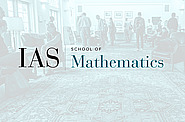2023-2024 Seminars
Apr
08
2024
Computer Science/Discrete Mathematics Seminar I
Polynomial Capacity and its Applications: To TSP and Beyond
Jonathan Leake
11:00am|Simonyi 101 and Remote Access
Apr
02
2024
Computer Science/Discrete Mathematics Seminar II
New Derandomized Agreement Testers
10:30am|Simonyi Hall 101 and Remote Access
Apr
01
2024
Computer Science/Discrete Mathematics Seminar I
Tight Cell-Probe Lower Bounds for Dynamic Succinct Dictionaries
Huacheng Yu
11:00am|Simonyi 101 and Remote Access
Mar
19
2024
Computer Science/Discrete Mathematics Seminar II
Geodesics and Minimal Surfaces in a Random Environment
10:30am|Simonyi Hall 101 and Remote Access
Mar
18
2024
Computer Science/Discrete Mathematics Seminar I
Computationally Sound Proofs of Network Properties
Rotem Oshman
11:00am|Simonyi 101 and Remote Access
Mar
12
2024
Computer Science/Discrete Mathematics Seminar II
The Structure of Translational Tilings in Z^d
10:30am|Simonyi Hall 101 and Remote Access
Mar
11
2024
Computer Science/Discrete Mathematics Seminar I
Sparsification of Gaussian Processes
Anindya De
11:00am|Simonyi 101 and Remote Access
Mar
05
2024
Computer Science/Discrete Mathematics Seminar II
Locally Consistent Decomposition of Strings with Applications to Edit Distance Sketching
Michal Koucký
10:30am|Simonyi Hall 101 and Remote Access
Mar
04
2024
Computer Science/Discrete Mathematics Seminar I
Explicit SoS Lower Bounds from High Dimensional Expanders
Max Hopkins
11:00am|Simonyi 101 and Remote Access
Feb
27
2024
Computer Science/Discrete Mathematics Seminar II
Computing Greatest Common Divisors of Polynomials in Parallel
10:30am|Simonyi Hall 101 and Remote Access
